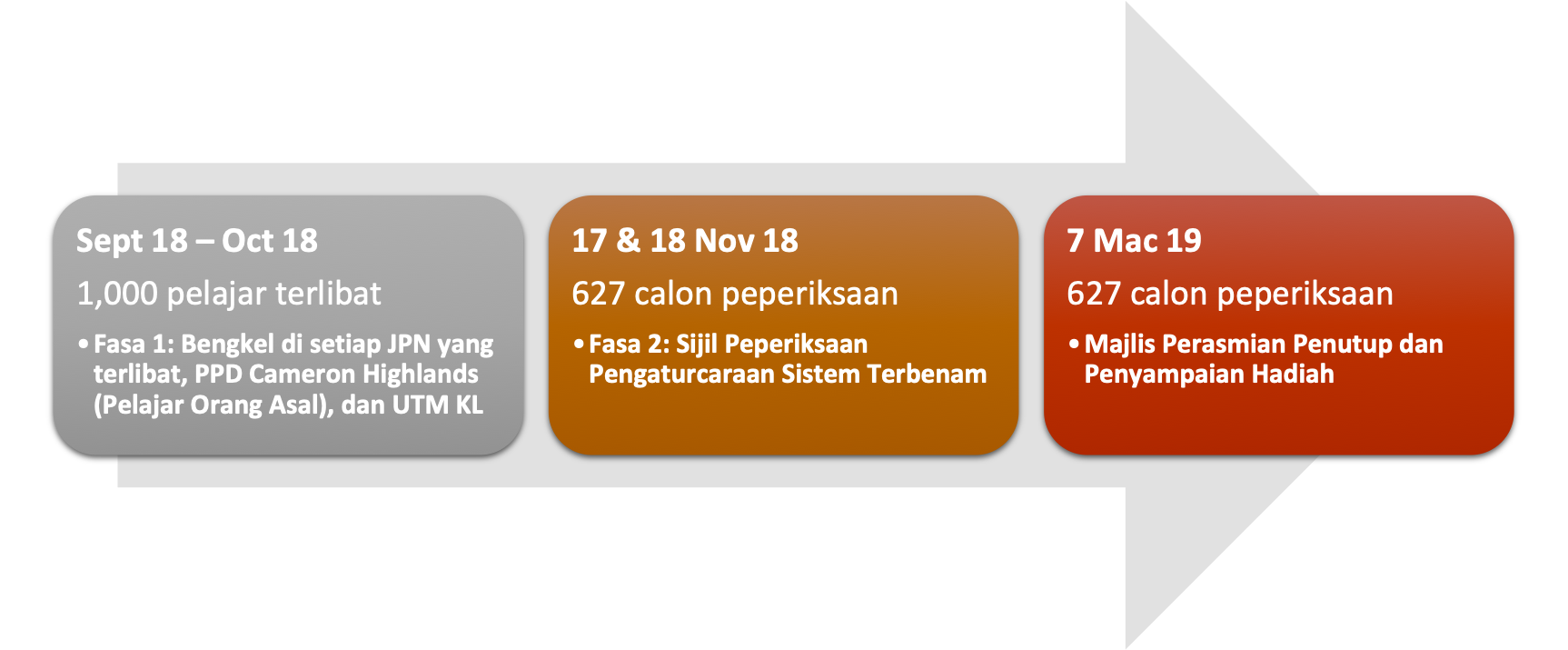5 Star Rating KTP MESPC2018

HIGH SKILLS EMBEDDED SYSTEM EDUCATION FOR THE FUTURE
In preparation towards a competent and skilled industrialised nation, Malaysia needs to increase the number and diversity of its STEM-educated workspace and establish wider opportunities for job creation. Reskilling and upskilling programmes that are knowledge-intensive incorporated with cognitive skills, critical thinking, computational, ethical and security, continuous learning, and psychomotor in embedded systems programming are required to accommodate the transformational needs of IR 4.0. These skills will enable students to be creative, critical thinkers, and problem solvers. Unfortunately, despite current attempts in embedded system education, it remains a challenging and specialized subject. It requires the students to have a solid knowledge of both hardware and embedded programming skills.
Embedded System Education
Embedded systems can be defined as “information processing systems embedded into a larger product that is normally not visible to the user”. They control physical processes with diverse complexities, ranging from automobile ignition systems to controllers for in-flight systems and nuclear power plants. According to the ARTIST Guidelines for a Graduate Curriculum on Embedded Software and Systems, embedded systems education should be multidisciplinary and contain control and signal processing, real-time processing, systems architecture, and engineering. Teaching embedded systems are challenging mainly because of interdisciplinary relationships, limited time, variations of students’ motivations, skills, and backgrounds. There are several teaching approaches; among them are hardware-oriented, software-oriented, as well as hardware and software integration oriented.
MESPC Programming Skills Challenge
MESPC that was initiated in 2018 is one of the initiatives that respond to the Ministry of Education Malaysia’s desire. It is objective to see university collaboration with the private sector based on Corporate Social Responsibility (CSR) and volunteerism to improve the quality of national education as a catalyst for excellence, relevance, and effectiveness. In line with this, a group of researchers from the Razak Faculty of Technology and Informatics, UTM, has collaborated with Drabot to conduct a study on the effectiveness of practical embedded systems workshops for students throughout Malaysia. Drabot contributed around RM 25,000 of the overall cost, while UTM contributed RM 5,000 and in-kind support such as spaces, volunteering students, and support staff; invigilators, interviewers, and secretariats. In 2018, we received 333 participants while in 2019 we received 1193 participants.
MESPC project aims to cultivate embedded system programming skills amongst the young generation, to give an early awareness about the importance of being a product developer rather than just being a product user and to improve knowledge and skills in embedded system programming among primary, secondary, and university students in Malaysia. This project involves several universities and education departments such as Kedah Education Department, WP Kuala Lumpur, Kelantan, Melaka, and Cameron Highlands District Education Department. This project had organized a competition based on a practical and level-based assessment on embedded system programming skills to test their knowledge level in the embedded systems field. Moreover, Embedded System Programming Examination Certificate (ESPEC) was prepared according to the level of student achievement: Starting from Grade 1(the lowest) to Grade 10 (the highest).
Impact on communities
In this project, a survey questionnaire was developed to assess the student’s prior cognitive skills to succeed in embedded system programming. This instrument can be used as the foundation to identify the gaps in schools and universities’ curriculum prerequisites and incorporate these requirements into the course curricula, school syllabus, teaching, and assessment. This will ensure that we will produce high-skill students and industry-ready graduates’ talents.
In conclusion, teaching embedded system programming is quite challenging because its require a broad knowledge. The instrument’s analysis of 19 items to measure student readiness in studying embedded systems programming shows that the instrument is sufficient. The findings demonstrated that most students have adequate prior knowledge, understanding, and skills, and hence they are found ready to learn embedded systems programming but the number of female students are still minimum. However, students require learning approaches that enable them to learn and engage in higher-order thinking skills and participate in meaningful academic engagement. Therefore, there is a need for schools and universities to be aware of the extent of the embedded systems learning problem and to take remedial action to improve the chance for success of the students taking embedded system course.
————
This project was funded under Knowedge Transfer Program – Research Innovation Grant (KTP-RIG) and was awarded 5-star rating.
Related article was published in Harian Metro dated 1st April 2019 headline ‘Si Genius 8 Tahun’
